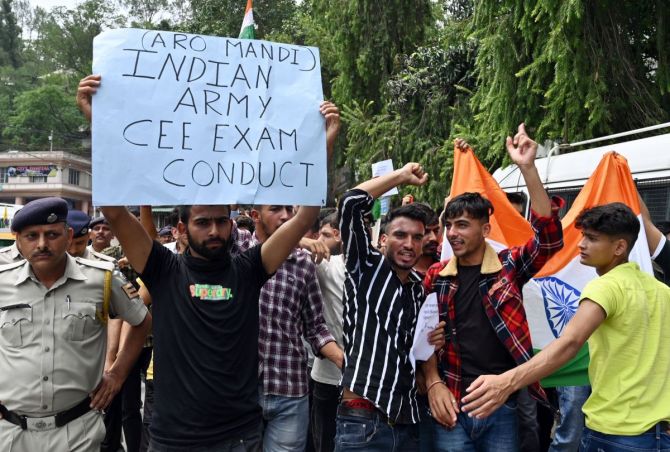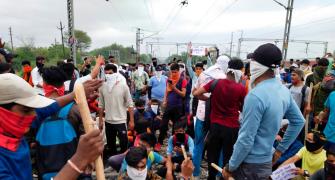The thing is that unemployment and joblessness are a personally felt shame.
It is not easy to mobilise a set of people who identify with others as a group that cannot get work, points out Aakar Patel.

On the Agniveer issue, the government has again acted first and contemplated the consequences later.
What was meant to be an experiment and affecting only a small portion of the recruitment suddenly replaced the existing process entirely.
The tweaking of the scheme on the fly, first allowing those over 21 to apply this year and then announcing a reservation scheme for jobless Agniveers in the paramilitaries tells us that those who thought up the scheme had not thought it through.
The violence was almost predictable. Earlier this year, similar incidents broke out in the same areas when the process for recruitment for railways was messed up.
This time those training to appear for recruitment in the armed forces and made to wait for two years (at the risk of their becoming too old to qualify) because of the pandemic were now told that the scheme they trained for was over.
They would not be hired as their fathers and ancestors had been in the army, with the dignity of retirement and being referred to forever as a fauji.
They would be on contract and most of them sent home in four years.
This is not what they had trained for. The government is blaming the Opposition for the episodes of violence but there is no credibility in this accusation.
One sign that the government knew that there was going to be a problem was that the prime minister did not announce or inaugurate the scheme.
It was the defence minister and the service chiefs who were sent out to sell it.
Narendra Modi's faithful will say there is nothing wrong with it and in fact that is the way it ought to be announced.
Yes, but that is not the way things have been happening since 2014.
On anything of import, it is one individual who comes before the cameras to say that great and new things are in the offing.
To undo a tradition of recruitment that is 225 years old and replace it overnight is the kind of masterstroke that only Modi gets to announce.
And so Agniveer joins the farm laws and the CAA and Demonetisation and the Lockdown on the list of things that the government announces first and then thinks about later.
The question is will it end up as the farm laws and CAA which were either pulled back or shelved because of resistance.
In my opinion, the Agniveer scheme will go through and that is essentially because this sort of violent protest does not last long and the young men currently expressing their anger will eventually be spent and return home.
We have seen violence on the issue of jobs before, for example during the Patidar Andolan in 2015.
What seemed to be initially a mass movement in a few days petered out and in fact none of their demands for reservation or jobs was fully met.
It has been only the peaceful, long-term mass-mobilisations such as in the case of the CAA and the farm laws that have seen victory.
It would have been better for the young men angry at being shortchanged by the Agniveer scheme to have approached this peacefully and with the long term in view.
But they did not have organised leadership and as such are not a formal group.
The thing is that unemployment and joblessness are a personally felt shame.
It is not easy to mobilise a set of people who identify with others as a group that cannot get work.
Even if they do come together, as they have twice this year, it tends to be to express their extreme emotion and distress at being let down instead of gritting their teeth and organising a peaceful agitation.
For this reason, I think that quite soon this particular episode will be behind us and the government will be able to push the Agniveer scheme through.
Others, more knowledgeable than me, have written about the pros and cons of the scheme, but for the person willing to listen to both arguments it is clear that the cons are catastrophic in nature while the pros are purely about spending less money.
The last thing to note here is that while mobilisation on unemployment is not easy, the problem is deep and will not go away.
Data that the government released this month from the Periodic Labour Force Survey shows that India is shedding jobs instead of adding them.
A full 17% of those who are 'employed' today are in the unpaid household worker category, meaning that they are housewives.
For the first time in history, India has seen people move away from manufacturing and services and into agriculture.
Economists believe that this increase is a proxy for joblessness.
Meaning that those who have returned back to the village from jobs in the city are claiming to be farming because they are too embarrassed to say that they are not working at all (again, the shame of joblessness).
In all, there is no difference between the government's data and that of the private firm CMIE, which says that the number of Indians over 15 who are working or looking for work is around 40 crore people.
The rate of participation is the lowest in South Asia and among the lowest in the world.
There are no jobs in New India and the anger over army recruitment is emblematic of a much larger problem.
Aakar Patel is a columnist and writer and you can read Aakar's earlier columns here.
Feature Presentation: Aslam Hunani/Rediff.com









